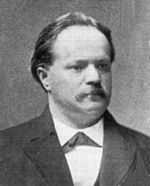Lazarus Fuchs
| Lazarus Fuchs | |
|---|---|
|
Lazarus Immanuel Fuchs (1833–1902) | |
| Born |
5 May 1833 Moschin, Prussia |
| Died |
26 April 1902 (aged 68) Berlin, German Empire |
| Residence | Germany |
| Nationality | German |
| Institutions |
University of Greifswald University of Heidelberg University of Berlin University of Göttingen |
| Alma mater | University of Berlin |
| Doctoral advisor | Karl Weierstraß |
| Doctoral students |
Gerhard Hessenberg Edmund Landau Hermann Schapira Ludwig Schlesinger Issai Schur Theodor Vahlen Ernst Zermelo |
| Known for |
Fuchsian groups Picard–Fuchs equation Fuchs's theorem |
| Influences | Ernst Kummer |
| Influenced |
Jules Henri Poincaré Marie Ennemond Camille Jordan Felix Christian Klein |
Lazarus Immanuel Fuchs (5 May 1833 – 26 April 1902) was a German mathematician who contributed important research in the field of linear differential equations.[1] He was born in Moschin (Mosina) (located in Grand Duchy of Posen) and died in Berlin, Germany. He was buried in Schöneberg in the St. Matthew's Cemetery. His grave in section H is preserved and listed as a grave of honour of the State of Berlin.
He is the eponym of Fuchsian groups and functions, and the Picard–Fuchs equation; Fuchsian differential equations are those with regular singularities. Fuchs is also known for Fuchs's theorem which states that if x0 is a regular singular point then the differential equation
has at least one solution of the form
for some σ to be determined. In some cases, there will be two linearly independent solutions of that form.
Selected works
- Über Funktionen zweier Variabeln, welche durch Umkehrung der Integrale zweier gegebener Funktionen entstehen, Göttingen 1881.
- Zur Theorie der linearen Differentialgleichungen, Berlin 1901.
- Gesammelte Werke, Hrsg. von Richard Fuchs und Ludwig Schlesinger. 3 Bde. Berlin 1904–1909.
References
- ↑ Wilczynski, E. J. (1902). "Lazarus Fuchs". Bull. Amer. Math. Soc. 9 (1): 46–49. doi:10.1090/s0002-9904-1902-00952-x. MR 1557937.
External links
- Jeremy Gray (1984). "Fuchs and the theory of differential equations". Bulletin AMS (New Series) 10 (1): 1–26. MR 722855.
- G. B. Mathews (1902) Lazarus Fuchs Nature 66:156,7 (#1702).
- O'Connor, John J.; Robertson, Edmund F., "Lazarus Fuchs", MacTutor History of Mathematics archive, University of St Andrews.
- Lazarus Fuchs at the Mathematics Genealogy Project
|


